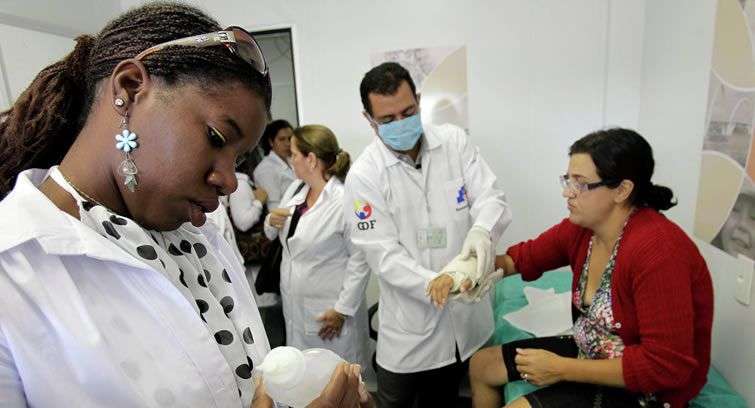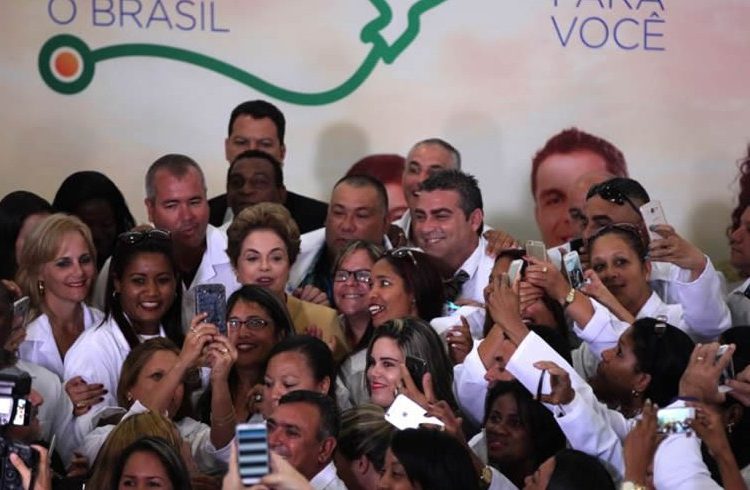Ruled by President of the Federal Supreme Court (STF) Ricardo Lewandowski, the Brazilian Senate conducted the proceedings—the result was already a bygone judgment—; and last week it was approved, by 61 votes to 20, the removal from office of the democratically elect president of Brazil, Dilma Rousseff. Michel Temer (Brazilian Social Democratic Party, PSDB)—his vice-president during this second term of office, one I do not even dare to catalog as a former ally of the head of state—is in her place.
Analyst of International Politics Peter R. Brieger summarized what happened in the Brazilian Senate with a phrase: “Voted by 54 million people. Removed by 61.” Even though the math of this result is more complex—many of these votes are due to the Dilma-Temer formula presented by the former president during her 2014 candidacy—, there is an unquestionable core matter in this phrase. The approval of the impeachment process translates immediately into the fact that Brazil will be run by a politician who, if general elections are to be called right now, would only get five per cent of the votes. Moreover, Brazil is run today by an officer who will not be able to hold government posts once his term is over; because last May 3, he was condemned by the Regional Electoral Court of São Paulo for making campaign donations exceeding the legal limits.
Unable to demonstrate the alleged tax crimes, the criminal liabilities—the only legal argument to back up the impeachment—, a majority of white men condemned the president by using God and family as burden of proof, in the most traditional sense.
This is the result of a country with more churches than schools, with more devotees than citizens. It is also the result of a nation that, regardless of the fact that 54 per cent of the population is black and 51 per cent is female, there is a political system made up of institutions like the House of Representatives, where 90 per cent of congressmen are white, 90 per cent are men, and less than one per cent are black women. Besides, this is the outcome of a process led by politicians such as former Speaker of the House of Representatives Eduardo Cunha and President of the Senate Renan Calheiros, both under arrest warrants issued by Attorney General Rodrigo Janot.
Errors made by the (former) guerrilla fighter and the Workers’ Party (PT) cannot go unnoticed in the path that has come this far; and even they, in a lesser or greater degree, have acknowledged that. There were leading failures, identity and competence faults. The alliances formed by the several representatives conducting the impeachment, the deplorable episode of the Belo Monte hydroelectric dam, and even the shy answer and—in my judgment— limited reading before the demonstrations of March 2015 and 2016 are proof of the mistakes.
The fact that many of those who voted for the definite removal of the former president immediately afterwards voted against undermining her political rights turns out to be revealing.
But there is no shade without at least a shaft of light. Over one hundred thousand people demonstrated in São Paulo last Sunday for demanding Michel Temer’s dismissal. In Brazil, the democratic option of calling a general election is starting to gain force against the parliamentary coup. On the one hand, Dilma Rousseff in her first speech as ex-president has promised to provide a firm opposition to Temer’s government– bear in mind that the PT has seventy congressmen (13.65 per cent) in the House and twelve senators (14.5 per cent). On the other hand, former President Luiz Ignacio Lula da Silva has reactivated his political life in the country and has suggested the creation of a widespread left-wing front to face Temer’s government. According to Datafolha’s most recent opinion poll, Lula is leading the intention of votes in connection with presidential elections (22 per cent).
The future of Mais Médicos
Since the establishment of the temporary government run by Michel Temer, last May 12, a part of the media—leftist mostly—reflected the possibility of an eventual end of the Mais Médicos federal program. Launched by Dilma in 2013, the program mainly aims at supplying medical attention to Brazilian communities with limited or non-existent healthcare system. From the beginning, it has become the subject of strong criticism from medical associations and schools all over the country, as well as from figures accusing the PT of using the program to accomplish political campaigns.
The opposition to the program has been particularly aggressive regarding the participation of the Cuban doctors. Some weeks ago, Senator Cássio Cunha Lima (PSDB) catalogued Mais Médicos as a witty maneuver of the PT and suggested that Cuban professionals could ideologically indoctrinate the poor populations. Likewise, Senator Mário Couto (PSDB) criticized the agreement with Cuba, because “it is reached with a dictatorship.” Moreover, since the issuing of the impeachment process, the new Brazilian foreign affairs minister, Senator José Serra (PSDB-SP), has subsequently stated in an emphatic manner his opposition to the adopted stance by ALBA member countries, especially Cuba, Venezuela, Bolivia, and Ecuador—these last three have just announced their ambassadors’ withdrawal from Brazil.
Now that Dilma Rousseff has been removed from office for good, what are the current situation and the future of the program, especially the place of Cuban doctors?
According to recently published data by Folha de São Paulo, 11 429 Cuban doctors have joined the Mais Médicos program since August 2013, representing 62.65 per cent out of the 18 240 professionals that would take action in Brazil. The initial arrangement of the program was made for three years (2013-2016), a time span allowing Cuban professionals—foreigners in general— to practice without having to revalidate their diploma. Passed this time, and in case of the extension of Mais Médicos, only those who revalidated in Brazilian State universities could continue taking part in the program. As mentioned before, amidst the politic turmoil that has been shaking Brazil for several months, not a few people speculated about an eventual end of the project, catalyzed by the definite removal of Dilma.
However, last April, the stopgap measure 723/2016 dictated by the ex-president came into force eliminating the requirement of revalidation for the continuity of foreign physicians in the program. The measure was approved by the Chamber of Deputies and the Brazilian Senate, on August 22 and 26, respectively. This way the Mais Médicos Program was extended for another three years, including of course the participation of the Cuban professionals. Nevertheless, the current President—non-elect—Michel Temer and his Minister of Public Health Ricardo Barros have emphasized the fact that they will begin to take measures in order to include a higher number of Brazilian doctors, thus narrowing the amount of foreign professionals.
The extension of the program is good news—more related to its unquestionable results than to the political will of the new government team. In Brazil, Mais Médicos is widely supported by a great percentage of the population, by some governors, and mainly by the local authorities (prefeitos and secretaries of health). The last ones put pressure on the House, the Senate, and the Federal Government to make them agree to extend the program. Furthermore, Mais Médicos’ outcomes have been endorsed by the UN and several Brazilian institutions.
A study carried out by the Federal University of Minas Gerais—with the participation of fourteen thousand people from seven hundred Brazilian municipalities—showed that on average the cooperation doctors were top-graded by 9/10, 55 per cent of their patients, and they were praised for their work by 87 per cent. The argument requesting to extend the program approved by the House of Representatives also mentioned that near 63 millions of Brazilians, equivalent to around the 30 per cent of the population, have been aided by the program. That is, the program having over 60 per cent of Cuban participation has reached excellent results, and consequently, patients and authorities expect Cuban professionals to remain in Brazil.
Untill 2019

Once approved the extension, a great amount of Cuban doctors will continue to cooperate with Mais Médicos until 2019. Everything seems to point out the professionals that started the program in August 2013 will not be the ones to continue though. Firstly, because the individual contracts signed between the doctors and the Company of Medical Services S.A. states that “the return of the Cubans arrived in Brazil since August 2013 will be effective three years after their arrival in the Federative Republic of Brazil. Besides, the Cuban authorities have decided not to extend the contract for other three years to the same doctors who have already served in there and to give priority to dispatching new ones. This has been widely covered by the media in Brazil.
OnCuba could confirm in conversation with several professionals from the groups arrived in Brazil in 2013 that the Cuban authorities have already notified of their definite return to the Island starting from next November. Knowing the decision—that contrasts with the great levels of permanence of our professionals in the Program, reported by DataFolha (92 per cent)—several cooperation doctors conveyed that even though the regulations have already been set, they expect the situation to be reversible. They do not want to leave. They also remark that the refusal of the Cuban State to extend their contracts has raised uneasiness in a lot of doctors as well as concern in the aided population and in some municipal health departments.
Considering the already cemented links with patients and Brazilian authorities, with the cultural elements of the population, and the precedent of the Medical Mission in Venezuela, where contracts were extended even, in some cases, for more than seven years—they add—, many believed that the step was to extend the contract of those who were already in Brazil.
Others, however, commented to OnCuba that “they understand the logic that professional and economic opportunity, an air are offered to the ones who are there, provided that this does not imply we have to wait for five years to go on a mission again,” as it has begun to leak out off the record.
Beyond the strategy of replacing the group of the program’s lead-off professionals—in any case debatable—, Cuban participation in Mais Médicos will extend in spite of the impeachment process. This was reassured by Cuban Vice-Minister of Public Health Marcia Cobas Ruiz during a meeting with Brazilian Minister Ricardo Barros and representatives of the PAHO, carried out in Brasilia last July. During that meeting, Cobas Ruiz made clear that “Cuba would respect the contracts initially signed with Brazil and the PAHO and will continue its participation in the program, even though there are a number of elements to be reviewed.”
One of those elements is the request of a 30 per cent raise of doctors’ salaries. The Cuban vice-minister justified the request presenting as argument the devaluation of the Brazilian currency (Real-R$) since 2013 without having made any adjustments. At present, Brazil pays R$ 10 513 to each foreign professional that takes part in the program. The Cuban doctors receive around 33 per cent of that amount (R$ 3000). The rest is transferred through the PAHO agency to the government of the Island. Cuba’s request for a salary raise is been currently analyzed.
The Brazilian media have reported that the authorities of that country have offered a readjustment of the 10 per cent that in any case would not take place in 2016. It is expected that after raising the requested “whole” salary, it will be also reflected in the Cuban doctors’ wages that did not change at all during this three-year period despite the mentioned fact that the Brazilian currency dropped its value.
Guaranteed by the Brazilian House and Senate, but above all, due to the results brought about from having supplied medical attention to close to 63 million Brazilian people (30 per cent of the population), Mais Médicos has outlived the impeachment process. Mais Médicos continues and will continue to exist—as everything suggests—with (renewed) participation of Cuban professionals.











